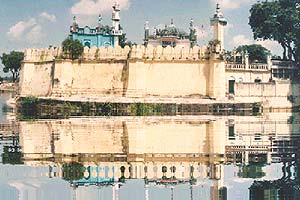1. Dewa Sharief : Haji Waris Ali Shah was born in early nineteenth century in Dewa in a family of Hussaini Syeds. His genealogy traces origin from Hazrat Hussain, the grandson of Prophet Muhammad and martyr of Karbala, through 26 linkages in between. Some researchers have concluded his date of birth in the year 1809 A.D. His parents died when he was three years old and he was brought up by his grandmother. He was sent to maktab (preparatory school) at the age of five, where he learnt Quran by heart. Like all holy men, his biography has been embellished to look more holy than human.
He did not feed on his mother’s milk during daytime as an infant; neither did he take it on 10th of Moharram, the Yaum-e-Aashurah (the day Imam Husain, his relatives and friends were killed in Karbala, now in Iraq).He seldom read his books but to the amazement of his tutor he could say his lessons correctly. He preferred solitude to books and often slipped away out of doors to spend long periods in retirement and contemplation. He was never seen playing with children of his age and took pleasure in giving them sweets and distributing money among the poor. It soon became evident to those around him that he was not quite of the earth.
When he was 11 years old, he pledged allegiance to his mentor and brother-in-law, Hazrat Khadim Ali Shah who made him his spiritual heir. At he age of fifteen he undertook a long journey of 12 years that took him to Saudi Arab (it wasn’t exactly ‘Saudi’ at that time but oh well), Turkey, Syria, Iraq, Rome, France, Belgium, Germany, and Russia. He traveled on foot and performed Hajj 10 times during the course of his journey. He also met Sultan Abdul Majid, the Ottoman ruler, while visiting Constantinople and was the guest of Prince Bismarck in Berlin. His followers claim that he was the first Sufi to actually visit Europe.
After returning from his sojourn, he resided in Dewa and preached the message of love till his death in 1905. Even today he continues to inspire millions of devotees who flock to his shrine every year. On any given day one would find as many Hindus and Sikhs if not more as Muslims visiting his shrine and seeking blessings. There is a majestic mosque and a Khaankaah (place for spritual salvation) near his shrine as well as shops selling souveneirs and sweets.
The Family Connection
Apart from Faridan bibi, our family has had other connections with Haji saahab as well. Masih Uddin Ahmad, one of the London educated Bar-at-Law cousins of my great grandfather became ‘westernized’ in his outlook on his return from vilaayat. At my ancestral home in Ahmadpur he joked about Haji saahab and his mytical powers and then went to sleep. In the night he awoke shouting and told others that he saw Haji saahab standing next to his bed threatening to turn it over. At dawn the horse-cart was prepared and Masih Uddin Ahmad went to Dewa to become a disciple of Haji saahab. He willed to be buried at the footsteps of the shrine of Haji saahab and his grave is on the left side of the entrance to the shrine.
One of my aunts was married in a village near Dewa called Kheoli. All her in-laws are disciples of Haji saahab and he used to visit their home at Kheoli. My aunt tells me this story whenever I visit her home that during rainy days when Haji saahab came down to visit, he would walk on the wet ground and his feet never gathered mud.
Dewa Mela
It is one of the most popular and big gatherings in the city of Barabanki each year. Even though the Urs of Haji saahab is commemorated on 1st Safar every year, Dewa mela is organized at a fixed time period from 8th to 18th October of each year. The management of Dewa mela is handled by a trust whose chairman and secretary are the current District Magistrate and SDM of Barabanki respectively. The first chaadar on the shrine is always from the District Magistrate to kick start the mela. The mushaira and kavi sammelan organized during the Dewa mela have still maintained the standard and are one of the sought after events in the area. Some of the biggest poets have recited their verses at the Dewa mela. It also houses one of the biggest baazaars and villagers from far and near come for shopping goods and for an evening of entertainment.
3. Hazrat Makhdoom Shah Mia sahab(raz)





















No comments:
Post a Comment